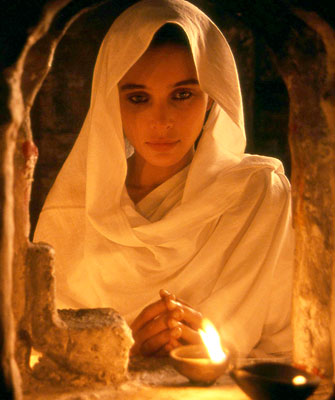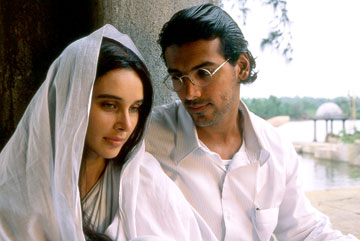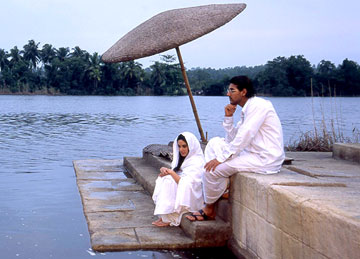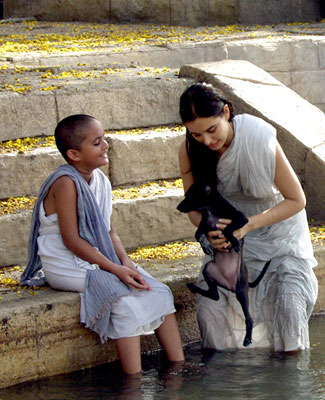

PopEntertainment.com >
Feature Interviews P to T >
Oscar Nominees >
Lisa Ray
 LISA RAY
LISA RAY
MAKES HER SPLASH
IN WATER
by Brad Balfour
Copyright
©2006 PopEntertainment.com. All rights reserved.
Posted:
June 29, 2006.
What's it like to be
proclaimed the most beautiful woman in a country of nearly a billion? Ask
actress Lisa Ray, who was considered the symbol of beauty for India in
recent years. But as Ray will tell you, that was really inconsequential
when it comes to her real goals as an actress and personality – one who
has pursued serious ideas and education and is interested in making films
with such artistic and serious directors as Deepa Mehta.
As the doomed lead
in Water, Mehta's latest film, Ray gets to play a trouble and
nuanced character – and make the kind of film that she has always wanted
to make. So despite a start in a few Bollywood productions, Ray now has
emerged as a new face and promising actress, on the path she has always
sought after, having straddled the multi-cultural paths that her mixed
ancestry of Canadian, Polish and Indian has suggested.
Were you surprised
that you were cast for this film?
Totally [laughs].
You had worked
with [Water director] Deepa Mehta previously on a very different
project.
I should say that I
was surprised, right? [laughs] No, but nonetheless, it was a
surprise that she was reviving Water. I had no foreknowledge of
that. So it was a pleasant surprise. I still remember that because I was
in London and in drama school at the time when she sent me the script. She
said in her very Deepa Mehta way, “Oh, I'm just going to send you across
the script, just take a look and tell me what you think.” So I read the
script and about two pages in I realized that it was Water and
found it immensely intriguing. It was so compelling one of the most
lyrical things I've ever read. So I very much wanted to be a part of it.
Lyrical, that's a
good word for it.
Thank you. You can
use it.
What was the most
challenging part of this role in making
Water?
Everything was,
initially, a bit daunting I have to admit. Again, because it's a character
that is so far out of my personal realm of experience, there were certain
things like body language that I had to study and work on. I was
unfamiliar with widows, and it's a period piece, and when I actually got
down to thinking about it, there was a whole list of things [I was curious
about].
Once I started my
research, and my preparation, and landed up in Sri Lanka for about two
weeks of rehearsals, it just happened all very organically. I relaxed into
it, and have supreme confidence in Deepa's ability. And I knew that she
would work really hard to bring the best out of me. And at the same time
also I felt a great sense of responsibility, that she had endowed me with
this great privilege. So, it was a meeting of two, meeting at the halfway
point.
 What was it that
transformed Lisa Ray, who now lives in New York City and grew up in
Canada, into a widow in Varanasi? The transformation is so amazing; you're
almost unrecognizable.
What was it that
transformed Lisa Ray, who now lives in New York City and grew up in
Canada, into a widow in Varanasi? The transformation is so amazing; you're
almost unrecognizable.
Well first I tried
to leave my mind behind [laughs]. It sounds strange but as an actor
it's a strange process. I've realized that it's more valuable than
analyzing a role too much. You have to let go and work from your gut. Or
from your heart, in this case probably more from your heart. As I said
with all the preparation, it's such a strange alchemy; you can't predict
what's going to happen and how you're going to get to that place. You just
sort of try and do as much as you can to prepare yourself. And then let it
all go.
Part of it, of
course was Deepa – a large part of it. My co-actors were a great support
system. It was such an ensemble piece. [Actress] Seema Biswas was amazing.
She really assisted me a lot with a lot of the nuances, interacting with
the kid Chuyia, with Sarala, was amazing. Because my character is meant to
have this child like quality, and certainly spending time with a child was
very helpful. And I tried to be in character as much as possible during
the entire shoot, that was, that was important. I wore my sari on and off
the set [laughs] and I'd go for long walks by the ocean. I'd listen to the
music, A.R. Rahman's music of the film, which is so evocative, and
anything that helped me. There are photographs that Viyani took of me on
the set that I've seen, with me plugged into my Walkman, just listening,
sitting there in between shots or in between takes, listening to the music
that I found helpful.
In preparing for the
role, was there a lot of research? Did you learn a lot about Hinduism? Did
you do a lot of rehearsal or back-story with the other actors?
I did literally
everything that I could. I tried to be as prepared as possible. Which is
easier said than done, because as I mentioned I was in drama school at the
same time, in a full time course. So I was doing a lot of research, I read
a book that Deepa gave me, which was very insightful if you want to
yourself read more about widows of India. It's called Perpetual
Mourning. It's by Joan Alter Chen, who studied the widows of India
very extensively. It's an excellent study. It's a little ironic because
Deepa gave to me like just after Christmas and in it she wrote, "I'm very
sorry to give to you something called 'Perpetual Mourning' [laughs] during
Christmas." But it was all in the right spirit, so I read that, and that
was very helpful. I used to listen to my lines, my dialogue, recorded
because my Hindi was not perfect. I do speak the language but my diction
is obviously not perfect so I listened to my lines every morning on the
bus as I was going to drama school, and every evening when I'd come home
from drama school.
I'd come home and
put on a sheet and tie it like a sari just to get used to that. I attended
a workshop in India, with a very fine theater director, Neela Munsing, and
she sent me to live in a village. I sort of became the village's personal
servant, everyone's servant, because I was trying to do everything. I was
doing what they call 'charu bocha'--cleaning and sweeping.
Everything is
completely different, and has a cultural context. Finally of course the
rehearsal process was really essential, working one on one with Deepa, as
well as with the other actors. It was really such a passion project. It
was such a dream project for me to be a part of that at some point, you
have to trust and let go. That's a very strange part of acting, you can
only prepare up to a point, and then a lot of it is about just relaxing.
And as I said, I knew I was in good hands, so I was able to do that with
confidence.
 What was the drama
school like that you were in back in England, and did you finish the
course when you came back from
Water?
What was the drama
school like that you were in back in England, and did you finish the
course when you came back from
Water?
I did. It's called
ALRA, the Academy of Live and Recorded Arts. Everyone's heard of RADA and
LAMDA, but it's relatively new one of those accredited drama schools. And
the best thing about it is that it's housed in a former lunatic asylum.
Which is so appropriate [laughs]. There's a bunch of loony actors
showing up every day.
How long did you
live in India? Was there an unbroken period of time?
A long time. Well,
not completely unbroken, but almost eight years.
Really? After
college?
I didn't go to
college. That was right after high school.
And you went for
what reason?
It's a completely
weird story. I was on vacation; I'd just finished high school. Because I
graduated a year early, the deal I made with my father was that I wanted
to travel for a year, so I did my big European vacation in the summer and
in the fall we went as a family to India. We spent some time in Bombay,
and someone there saw me, and said do you want to model? And I said,
"Yeah, okay, why not? [laughs]" It really wasn't something like
that I wanted to do. I wouldn't have thought of doing it otherwise. So
that was a trigger and that was my main motivation in modeling-- the
opportunity to live in India.
And your acting in
Indian films, the
Kasoor role, came
after that?
That came after
that. I got a lot of offers to act in India right off the bat when I
started working as a model because I became this – it's really funny but –
this overnight sensation as a model. It's a very strange celebrity circuit
in India. It was very strange and a little bit unhealthy in my opinion.
Even weirder than
here?
Even weirder than
here if possible.
That's hard to
believe.
Hard to believe.
[Laughs]
Why didn't you do
anymore Indian films? Was there the possibility of more Bollywood films
after that?
Yeah but it was a
conscious decision not to.
Why is that?
I never grew up
watching Bollywood films. I have nothing against Bollywood. It's lovely;
it's camp. But it's a very different form of expression, so once I decided
that I wanted to act, and took it seriously, and decided that it's my
calling, obviously I wanted to pursue the cinema that I believe in, or
that I've grown up watching. So that necessitated a move back. In stages I
came back through London, that's, that's when I went to drama school.
So what do you think
of as cinema? What films have you seen?
I grew up watching
Fellini and Kurosawa and Satyajit Ray, and Goddard… My father's a huge
cinemaphile.
That's not what most
teenagers look at.
You're right. I was
completely twisted and weird [laughs]. That's why I feel Water is a
dream project, that's why I qualify it that way for myself because I find
it falls in that fine tradition of that type of cinema. Cinema that goes
that extra mile.
 Did you have
problems with Bollywood? You were fantastic as a lawyer in
Kasoor.
Did you have
problems with Bollywood? You were fantastic as a lawyer in
Kasoor.
I can do the dance
and song; it comes naturally because it's in your blood; you grow up
addicted.
And you did some of
that in Deepa Mehta's
Bollywood/Hollywood.
I did that. As I
said, I am just sort of as a performer obviously but Hindi's not my first
language. So ideally you want to express yourself in your first language.
But it's also a style of acting. Bollywood doesn't put a high premium on
fine performances. They're more interested in what we call stars, or the
personality of the actor. People go to watch that particular personality
on screen as opposed to seeing that personality become different things –
or to lose oneself in a role. So that's why it wasn't as interesting to
me.
Although it's
changing.
I believe there's a
really encouraging trend.
Your
Water co-star
John Abraham rarely does those clean-cut hero roles in Bollywood. They're
more negative…
He's been making
very interesting choices. Now there are choices, which is great. But I
didn't want to be in limbo. I thought I have to take a decision. It was
difficult to commute between India and North America. It's a pretty mean
commute. I decided that I had to be committed to what I wanted to pursue.
So that means living and working out here.
Now having made that
decision do you find yourself making the decision to be more Hollywood, or
more New York and independent oriented…?
Do I have to decide?
I don't have to decide.
No, but it's
interesting that then you have a new set of issues that, in a way, a new
set of decisions to make.
Aw, I'm just an
actor; I'll take what I can get [laughs].
But now you're
getting the offers to do important, valuable independent films; are you
getting called in to do Hollywood stuff because of your look--what do you
see happening?
I don't know. To be
honest, my journey has just started out here. So certainly I'm optimistic
and full of anticipation, and have seen that again, I've taken rather
unconventional choices in my life and as an actor. Sometimes you feel
you're put in a position where you can't say no. And I've said no more
often than not. But I feel that that's a power you can exercise. Because
by refusing certain things, people come to understand that this is what
you want to do by implication. So I'm hoping that sometimes it's through
your actions that people will come to understand that this is what you
want to do. That's what I'm here to do. Let's see what happens.
Email us Let us know what you think.